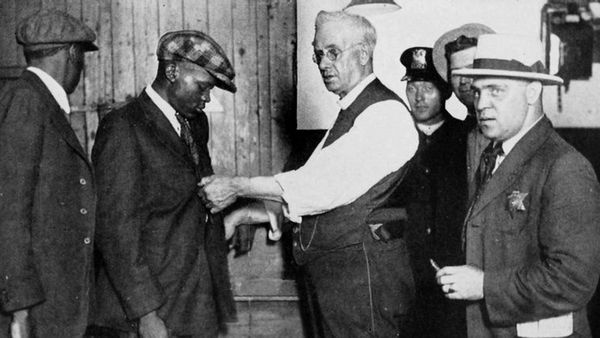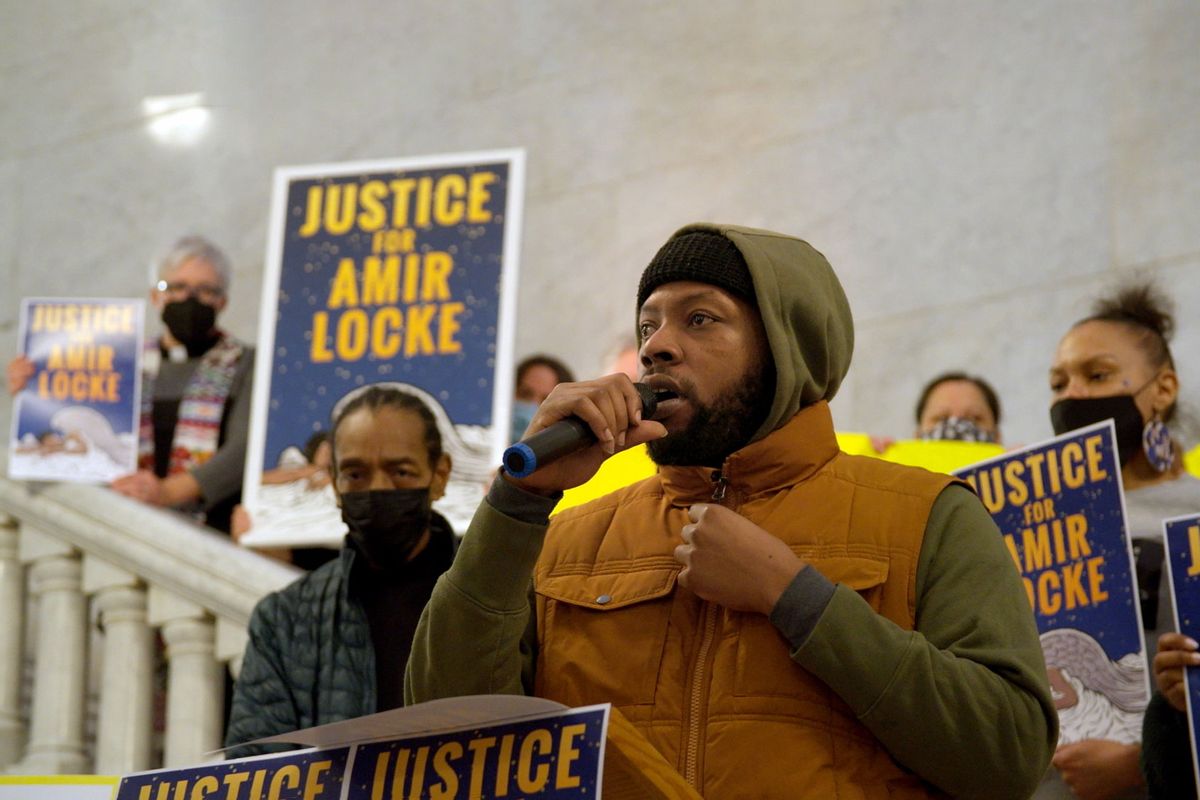The timely and chilling new documentary, "Sound of the Police," codirected by Stanley Nelson ("Attica") and Valerie Scoon, is a scathing indictment that shows why the Black community has long had justified reasons to fear the police. Opening with scenes of Amir Locke's funeral — Locke was killed by Minneapolis police officers who entered his home while he was sleeping — the film traces the history of law enforcement officials killing and abusing Black people from the era of slavery, through decades of lynchings, to the present day. Various talking heads, including Rev. Al Sharpton and Salon's Editor at Large D. Watkins, comment on the examples.
"I had a cop put a gun to my head on the subway pretty much for no reason."
The case studies presented by Nelson and Scoon show how systemic racism has developed over centuries as fugitive slave laws and Stop and Frisk policies were designed to keep Black citizens from living freely. There are discussions of so-called Karens — white women who call the police on Black men framed as threatening, as in the Central Park birder case — and how cop TV shows, starting with "Dragnet," reinforced positive images of policemen. Meanwhile, members of the Black community experience fear and insecurity, as they feel unserved and unprotected by the police.
Moreover, video footage of police brutality, from Rodney King to Eric Garner, Breonna Taylor, and Freddie Gray (among so many others) not only position Black victims as criminals, but also result in cases where the police are assaulting and killing these unarmed Black men and women and are not held accountable.
"Sound of the Police" connect the dots in its examinations of riots that have inflamed Black communities since 1919, and how an "us vs. them" mindset has developed as members of the Black community experience police interactions where they cannot fight back. Nelson and Scoon spoke with Salon about their powerful new documentary.
"Sound of the Police" shows many fraught interactions Black citizens have had with the police. Can you describe a personal encounter you have had with the police?
Stanley Nelson: I have had a number of encounters all my life with the police. Being stopped for no reason, being thrown up against the wall, raiding the neighborhood and searching everybody and handcuffing folks. I had a cop put a gun to my head on the subway pretty much for no reason. I've also had experiences with what we are now calling Karens. I had an argument over nothing in a movie theater and [was] told, "We're going to call security on you." It was clearly a threat. When they call security, you know what side they are going to take. It's a constant, especially when you are younger. As you get older it peters out a little bit, but when you are in your teens, 20s, and 30s, it's constant.
Valerie Scoon: I've been pulled over two or three times and asked, "Why are you here?" I said, "I live in that building," and they let me go. It's happened.
How did you decide what case studies to include? What criteria did you have for inclusion?
Nelson: One thing we wanted to do was to include case studies where there was video, and not just someone's word. Another thing we wanted to do was if we are taking about Karens or Stop and Frisk, that we have to show multiple, multiple, multiple instances. So you can't just think this was a one bad cop or one bad day. It happens over and over and over again. The film's structure was to go to the historical segments and flash to present and go back and forth, so we wanted things that would echo what we were talking about in the past.
Scoon: We were looking for lived experiences and that's what we represented when we found them.
 Officers search a Black man for arms at a police station - Chicago, 1922 photo seen in "Sound of the Police" (Hulu/ABC News Studios)
Officers search a Black man for arms at a police station - Chicago, 1922 photo seen in "Sound of the Police" (Hulu/ABC News Studios)
There is shocking and exasperating and infuriating footage of Black men and women being abused by police incorporated throughout your film. Can you discuss presenting this content? Your film uses these examples to effectively prove each point and compel viewers to ask: How can this happen? Why does this keep happening? When will things change?
Scoon: The idea of how and why this is happening, and how did we get here, was the question I was asking myself as I was talking with historians and experts. With the long view of looking at the history of policing, we see how it is tied into slavery and tied into the history of race relations in this country. It was important to follow that thread. When you get to the moments of violence in the documentary, they are disturbing to watch. It was important to show that reality. We are not making it up. That's why we felt it was important to show it. It reflected reality and a trend that has persisted since the time of slavery.
You present some positive images of the police, from "Officer Friendly," who visits schoolchildren, to TV cop shows that make policework look cool; they serve as recruitment tools. This is the flip side of the abuse — images that make the cops look appealing. What can you say about the image of the police in public consciousness?
Nelson: A couple of things were important to us. Visually it was stunning when you see the cop show intros cut together and you realize that during all our lives, we've seen hundreds of different cop shows, and the cops are good guys and concerned for doing the right thing for citizens. And for so much of the African American community, and other communities in the United States, that's not what the police represent. We tell our kids to avoid the police as much as you possibly can. I tell my son, "No good can come from a police encounter." It was important to show that, and it was also arresting visually.
We need your help to stay independent
"The important thing is to get out of the situation alive."
You also indicate that Black police officers do not necessarily have the opportunity to help their community. They often toe the line because of how they are trained. I can't imagine the mental toll it takes on these Black officers. What observations do you have about this?
Nelson: One of the things we are trying to say is that it is the institution of the police, and not the individual officers — not the individual African American officers or the white officers — but the culture of policing in the United States that is the issue. You can't be a cop without being part of that culture. At some point, African American officers join in. There is the thought that if we get more African American officers, it will become better, but that's not case. All of the statistics show that they join the police department, and the culture of that police department is already there.
Scoon: I would agree. I think what we are looking at, and what the experts point out in the documentary, is that it's the system that allows for a lack of accountability. That does not mean that all cops take advantage of the lack of accountability. This is not an indictment of Black cops or white cops; this is looking at the system. We do have [Black police officer] Chief Armstrong in the film, and he spoke about being stopped by the police many times and that was why he wanted to become an officer — to try to improve things.
Why does it feel things are getting worse? With every case, the situation seems more hopeless.
Nelson: I hope that is not the way the film makes people feel. There is hope. One of the things the film says is that things have to change. We don't say, "Go out and do this or that . . ." because that doesn't work. But if people start realizing there is a problem, that is the first step towards change. I thought about the Civil Rights Movement. Who thought things would change drastically in the Deep South? Who thought Apartheid in South Africa would end with Nelson Mandela becoming President, except for a few people? But that's all it takes. Change is possible. We have to recognize it as a problem and have to work towards change. And I think that change will be better for everybody. One thing a cop wrote was, "Can you imagine what It feels like to get out of your car in a Black neighborhood and everyone around you is radiating hate towards you and you face that every day?" It is soul-numbing. No one wants to sign up for that. There is a better way.
Scoon: I agree. Hopefully the documentary serves as a conversation starter in their communities with law enforcement. The people I spoke to in law enforcement do want things to be better. It is hard for them as well. It's stark and holding a mirror up to what's going on but hopefully, that would motivate people to find solutions.
Want a daily wrap-up of all the news and commentary Salon has to offer? Subscribe to our morning newsletter, Crash Course.
You show footage of Martin Luther King, of Black Lives Matter protests around the world. These nonviolent protests are contrasted with fighting back and riots as well as Black men and women seen on camera resisting being touched by the police, as well as harassed and abused. Every action seems wrong and situational. What is an appropriate response to this injustice?
Nelson: I agree with someone in the film who explains what he said to his kid, which is, "You just have to get out of situation as whole and alive as you possibly can. You'll have time afterwards to take some legal means. But you want to live through that situation." At those times, cops in this country have your life in their hands. If you are a police officer, you are carrying a gun. The important thing is to get out of the situation alive. And that's not exaggerating. That is how dire it is. That's why there is a call for change in policing. It is not any one situation, it is the totality of things in the country. We believe in change. It would be horrible if we didn't. We'd all be miserable. Hopefully, the film is the first baby step towards understanding.
Scoon: Looking at the history, I agree what our experts in the documentary say that you should do. But the idea of understanding the history allows, hopefully, to make it a less fraught encounter until people move forward and understand all the context. If you understand the history and relationship, you have a better tool to improve things for all of us. We are better than this. We can do this.
"The Sound of the Police" premieres August 11 on HULU.
Read more
about this topic
- My preschooler's first police stop: I'm embarrassed — but not for us
- "We Used to Win Here": A Salon film about Baltimore's growing divide in youth sports access and opportunity
- "The front door blew off the hinges": What happens when police raid your home without knocking first
- The incredible saga of Baltimore's worst gang: an elite police squad gone bad



Shares